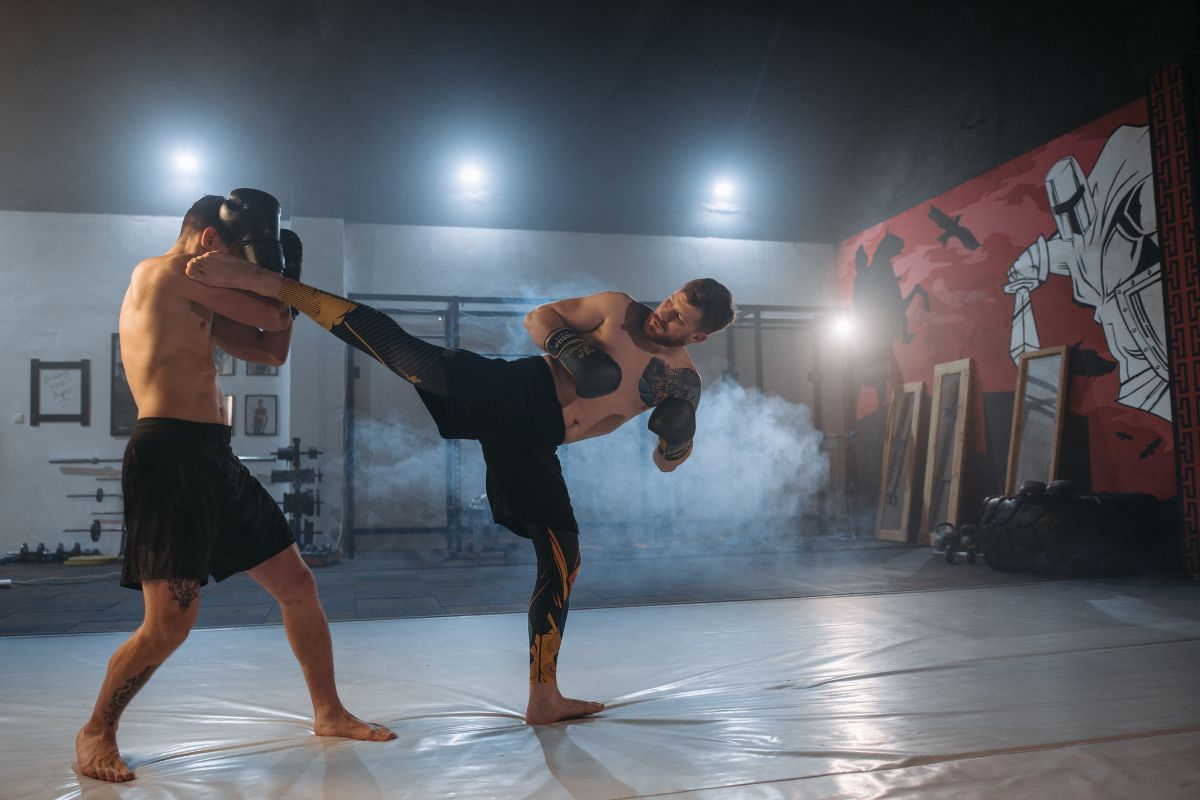The MMA Referee
Are you asking yourself how to become an MMA referee? We can all acknowledge that an MMA ref is essential in making a fight honest and safe.
It’s safe to say that being an MMA ref is a beautiful job and if it interests you, you can make a decent career out of it, as long as you’re prepared to put in the effort and, above all, fundamentally grasp how MMA works from a ref’s viewpoint.

How to Become an MMA Referee
How do you become a UFC referee? Do you need to attend MMA referee school? We’ll go through how to become an MMA ref in this section. Be advised that it’s a long and difficult journey – but if you’re determined enough, keep reading as we are about to explain how you can go about obtaining your MMA referee certification and MMA qualifications.
Attend Referee Training Classes
Both John McCarthy and Herb Dean provide referee training classes that will teach you the fundamentals of refining an MMA bout. These are one-day intensive workshops that normally cost a couple of hundred dollars. To be honest, these two are two of the finest ever to do it, so it may be worth the purchase.
Even if you believe you know everything there is to know about MMA qualifications, the truth is that you likely don’t. There are a lot of technicalities, protocols, and strange, unique regulations that you may need to master that you may study in these classes. Remember that being an online fan is not the same as doing it for a career.
Apart from the previously mentioned, if various courses are accessible, you could be able to practice them. Some individuals will not be able to learn from someone like John McCarthy. Therefore, you may have to attend a local course instead. While the knowledge may not be as exact, you will most likely learn something, and it will most likely cost less.
Obtain a State License
While taking a crash course on MMA rules is good, it will not get you in the door and is focused solely on knowledge rather than reality. In other words, you can have all the information in the world, but it will be useless without a license. This implies that obtaining a license is essential for your MMA refereeing career since you cannot legally continue without one.
This varies from state to state, and each nation has various requirements regarding a referee’s license. To obtain a license, contact your state’s athletic commission directly. This usually costs between $50 and $200, depending on the state, and you must pass a formal test to obtain a license.
It’s worth noting that certain state departments are notoriously delayed or difficult to reach. This is highly dependent on your location, as each commission operates differently. Expect a lot of chasing down, and be prepared to get annoyed. Obtaining a state license may be a long and arduous procedure for something that should be straightforward.
Begin Small and Local
You must start at the bottom and work your way up, much like MMA fighters. You may be the finest ref in the world, but you’ll need to establish yourself and have a decent reputation first. To achieve this, the best thing you can do is contact the event organizer and try to get on the card. If you need to prove yourself, you cannot even get paid for your debut.
Also, don’t expect to make much money on your first MMA business. Remember, you’re practically a nobody at this stage. Therefore you’ll be compensated accordingly. Another thing to remember is that you may referee a full event without stopping.
Unlike the UFC, several lesser organizations utilize only one or two officials for the night. Money is conserved when this gets done.
So, in the beginning, be prepared to do the hard labor. If you can secure a stable place, it will be all worth it since you can look at stable employment with higher promotions. To be honest, getting on a small event in the first place is difficult, but using it as a springboard for greater things is much more difficult.
Make a Name for Yourself by Being Consistent
Consistency, as the adage goes, breeds results. This is crucial to being a successful referee. Therefore make every effort to get each call right. This is difficult, but if you can see a video of yourself, it’s a great approach to learning from your blunders.
To summarize, consider this process seriously, and don’t assume you’re too excellent to strive to improve your refereeing abilities.
As with any ability, the more you practice, the better you will get. Finally, you might strive to build a name for yourself by having a distinctive image. Although your top goal should be fighter safety and fairness, this is something to consider.
Mike Beltran, for example, has a highly distinct appearance, while Mario Yamasaki has his signature heart logo. In a world where most referees look the same, you should aim to stand out and get noticed.
The Difference Between MMA Judges and Referees
Judges are ringside spectators who judge the match and determine the final judgment if no knockout or disqualification occurs.
They do not actually participate in the conflict but rather witness it. They score each round based on the competitors’ performance, deduct points for rule breaches, and eventually declare the winner if both fighters still stand after the fight.
In contrast, the referee takes part in the combat. He is constantly within the octagon and must ensure that the competitors follow the rules and respect one another.
He is also in charge of declaring the winner, but his real powers are restricted. He can deduct points for rule infractions, stop a fight, and declare a combatant unfit for further battle, but he cannot influence the winner’s decision.
MMA Ref – Prerequisites
The standards for officiating or judging MMA events differ by state commission or association. Most state athletic commissions will need you to have a physical and, in some situations, an eye test, as well as some form of training.
The ABC, or Association of Boxing and Combative Sports Commissions, is the most well-known training organization in the United States. This represents most state athletic commissions in this group.
There are various ABC-approved trainers. It is critical to understand that this is not a certificate but rather an instruction. You may recognize some of the names of the well-known ABC trainers. John McCarthy, Herb Dean, Blake Grice, Kevin McDonald, and others all offer ABC-recognized courses that go a long way toward teaching rules and grading criteria.
We’ve previously mentioned that you need a license to work as a referee, but first, you must take a course. What you learn in that course and how you utilize it will determine whether you can apply for (or purchase) a license. So, what exactly do you require?
According to “Big” John, his COMMAND program has three required qualifications, which without you will not be able to complete his classes and obtain the UFC license you so desperately desire. The first requirement is knowledge. Even though he is neither a competitor nor an analyst, the referee must know everything they do.
A referee must know all the methods, movements, and terminology. McCarthy’s COMMAND Course, according to material available on the Internet, contains around 115 distinct words that you must memorize and understand. The purpose of this component is to put your understanding and skills to the test.
After completing your program, you must be able to utilize the terminology given to you and be able to apply your understanding in discussion with the teachers.
The next thing you need to know is the rules, which are both anticipated and rational. You cannot be an adjudicator or a referee if you do not understand the rules to follow. As previously said, MMA officials did not have it simple initially.
There were no formal regulations, which some read as the referee holding no power over the fight, implying that he couldn’t even prevent the fighters from murdering each other. Of course, logic won out, and the rule-free sport quickly received the essential parameters which developed throughout time.
MMA now has extremely well-defined and explicit regulations to master before entering the combat arena. You must understand what the competitors may and may not do; you must understand how to work with the judges; you must understand what causes a fighter to be (un)prepared for a fight; you must understand a lot of information.
It’s not equivalent to understanding civil or criminal legislation, to be sure, but it’s also not akin to reading a magazine.
You must invest to be a successful referee, and understanding the rules is essential to your work. You’re not there to satisfy the audience – who would undoubtedly scream at you a lot if you follow the rules – you’re there to keep the combatants from becoming too aggressive, i.e., to defend the fighters as well as the event, not to enforce popular opinion, and so on.
Another crucial point to mention is that a referee must continually monitor and stay current with changes. When a referee receives his license, his training is not complete. It is never complete, and despite his expertise and reputation, a qualified referee will continually enroll in new seminars and courses.
If you want to be an MMA referee, remember that you’ll need to educate yourself till you choose to retire.

MMA Referee Salaries
The fierce matches are most likely the first thing that comes to mind when you hear about UFC. The devastating knockouts might take your full attention and focus. However, have you ever considered the function of the referee in these heated battles?
If you don’t, you’re not alone. So, how much do they get paid? Find out what a UFC referee’s pay will be in 2022 by continuing to read.
Several variables influence the pay of UFC officials and referees. These include their
experience and victories. They can even earn extra if they oversee many fights in a given evening.
As a result, a more experienced and well-known referee who works on high-profile fights often pays more. Similarly, if they officiate more fights, their chances of making more increase.
An entry-level MMA referee earns around $250 each fight, or roughly $14,500 annually. Professional fighters are paid around $2,500 each fight, with about $10,000 extra for PPV events. Annually, the sum comes to almost $380,000.They get around $1,500 every match, assuming they have 2 to 5 years of MMA experience.
A female MMA referee earns around $1,000 for each fight, with approximately a $3,500 incentive for PPV events. That works up to almost $60,000 each year.
Payments for pay-per-view events, which typically have larger budgets, can reach over $10,000 per fight, which is a significant sum of money. Of course, these are only official figures, and there are reports that some of them are significantly higher.
These figures only apply to experienced referees with a solid reputation in the UFC. Unfortunately, there is no equality across different groups or even genders. For example, entry-level and female refs earn far less than professionals.
MMA Referee and Judge Licensing
IMMAF grants licenses for international MMA refereeing and judging. You get a license upon accomplishment of an IMMAF International Referee and Judges Certification course and a person’s referee and judging ability and experience. To compete as an official in an IMMAF International tournament, all participants must have finished and passed the Ref & Judge course.
The Three Different Types of MMA Ref Courses
Big John McCarthy and Jerin Valel, MMA industry and subject matter specialists teach all three of these courses:
Referee Certification Information:
(Around $1250.00 for a 3-Day Course)
This course is highly challenging, and it is not ideal for individuals who are unfamiliar with MMA. Participants should also be in decent physical shape. Please acquaint yourself with the techniques mentioned as a requirement for the class since you need to recognize and name the takedowns, submissions, and positions displayed during testing.
There are four stages of assessment for certification; to be certified, you must pass all four portions with a 90% or above (in each section).
The first component is a technique exam in which you will view a video of techniques you must recognize and comprehend. The second examination is a written exam that includes everything studied in class and the present Standard Guidelines.
The third test is a test of technical skills in which you will referee a simulated fight (with pro fighters) and evaluate your cage/ring control, knowledge and application of the guidelines, and application of essential skills (such as movement and positioning), and many other fight-day requirements.
The final and fourth test is a scenario test, which is given concurrently with the practical implementation test.
In a mock locker room situation, you need to verbally describe a series of questions (for example, a fighter asking you to explain a certain rule or foul) and/or orally explain and illustrate how a certain strategy is implemented and executed properly by a fighter.
Because of the nature of the task, COMMAND has strict passing criteria. In addition to upholding the integrity of the Athletic Commissions, your competencies affect not only a promoter’s reputation but also a fighter’s career and potentially even their life.
All course participants who pass must sign and read a “Code of Ethics” policy. If you complete the course, your name will be on a qualification list accessible to all Athletic Commissions.
It should be evident that finishing the course does not guarantee you a license from any State Athletic Commission or any assurance of employment as an MMA referee or judge.
Judge Certification Information:
(Around $800.00 for a 2-Day Course)
There are three stages of examination for certification; to be certified, you need to pass all three portions with a 90% or above (in each section). The first portion is a technique exam in which you will view a video that includes all of the skills provided on this website.
The second examination is a written exam that includes everything you studied in class and the existing Unified Rules. The final test will ask you to observe a 5-round fight, grade each round, and then justify your ratings.
Because of the nature of the task being performed, COMMAND has strict passing criteria. In addition to upholding the professionalism of Athletic Commissions, your competencies affect not just a promoter’s reputation but, most crucially, a fighter’s livelihood.
Hybrid – Judge, and Referee in One:
(Around $1500.00 for a 3-Day Course)
This course is highly demanding and is not ideal for individuals who are new to MMA. This course combines Referee and Judge and needs intense mental attention. With this course, you will acquire Judge and Referee certificates.
Why Should a Ref Know How To Fight?
Three persons truly matter in every spectacular UFC fight. There are two fighters, but there is also the referee who ensures that the fight is clean and fair. Although the role of a UFC referee differs from that of a fighter, refs must still be able to fight before entering the cage.
A UFC referee must recognize when someone is unconscious because of too many blows or kicks to the head, which might result in death. That is exactly what occurred in a few boxing matches. However, nothing similar has happened in the UFC yet. But it doesn’t imply that deaths in MMA haven’t occurred previously.
In truth, Joo Carvalho died after his battle with one of Conor McGregor’s pals.
Something similarly awful may occur with a submission. Choking someone out is a common technique in Brazilian Jiu-Jitsu assaults. If the ref does not stop the battle in time, the individual may die from a lack of oxygen. This is incredibly unusual, though, because a chokehold takes a long time to kill someone.
However, chokeholds have killed people in the past, so if a ref does not intervene quickly, chokeholds can be hazardous as well.
Finally, things may become a little too hot in the octagon. Two people are attempting to beat up the other person, and one of them occasionally goes too far. In these severe instances, refs must be able to physically manage the participants so that no party is injured.
When they referee a fight, their expertise as combatants provides them with a unique viewpoint. They recognize when the conflict has ended and will typically not let the other person cause too much-unwanted damage.
According to ESPN, McCarthy wants rookie officials to have this sort of unique information through the COMMAND Program. The acronym COMMAND means Certification of Officials for Mixed Martial Arts National Development and passing the training required before becoming a licensed ref.

A Final Word
You must understand that there are plenty of referees and judges in the United States. In fact, there are simply too many in certain states to keep everybody working regularly. This is not to imply you should abandon your desire to be a referee or judge.
You should be aware that competition to be allocated to events can be severe. It may be tough to get assigned before officials and judges who have already established themselves within state sports commissions or amateur MMA-sanctioning bodies.

